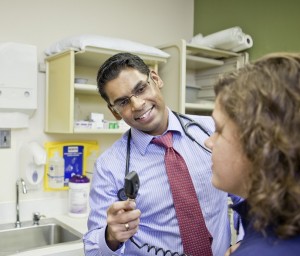
All day, every day, people make medical choices that have repercussions for common yet dangerous conditions like asthma, heart disease and diabetes. Although chronic disease takes a greater toll [PDF] on people with lower socioeconomic status, chronically ill patients are part of every community. In California and across the country, public health officials and physicians keep searching for the best way to get patients involved in improving their health.
Some patients naturally want to be involved with their care. Other times it's doctors and nurses who must try to encourage more engagement by their patients. “Whether to exercise or change their diet, take medication," Dr. David Thom told me recently, "those are the bread and butter decisions that go into primary care."
Thom, director of research in the UC San Francisco department of Family and Community Medicine, is launching a new study, exploring how patients make decisions when they work with a “health coach." Often health coaches are trained medical assistants who join the primary care team. “Our belief is that health coaches are going to have a fairly different relationship with patients than providers do,” he says. “Their role in helping the patients make decisions will be clearly different than the providers’ role.”
For example, coaches may help patients prepare questions in order to make the best use of limited face time with their doctors. Coaches might also accompany patients to appointments or help them navigate between multiple departments in a medical center.
Many coaches are bilingual and for Thom's research some are already trained and in place. Mission Neighborhood Health Center and Southeast Health Center, both part of the healthcare safety net in San Francisco, will be the first sites studied. Coaches meet with patients and sometimes patients’ families, follow up on the phone, and sometimes sit in on appointments. They have access to the doctors and other members of the primary care team.